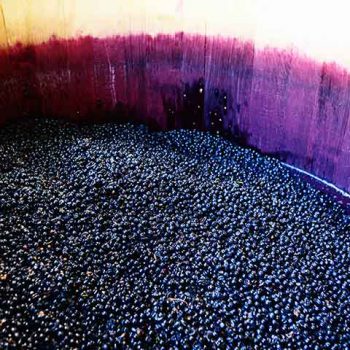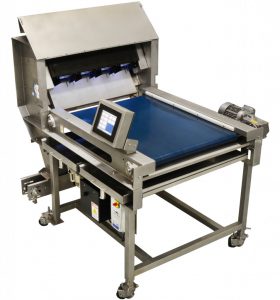WineGrapeTEK
Wine Grape Sorting
Optical MOG Sorting for the Wine Industry
WECO sorters remove MOG (Material Other than Grapes)—stems, jacks, shot berry and other types of foreign material including RAISINS. Automated MOG sorting with WECO’s optical sorting system will result in a higher through-put and reduced labor.
Better Quality and Higher Throughput
WECO’s Wine Grape Sorter uses the latest ChromaxHD optical sorting technology and advanced algorithms to efficiently remove under- and over-ripe fruit and foreign material (MOG). This offers vastly improved quality with increased throughput at a fraction of the price of alternative methods. Our system is also designed to be easy to understand and operate, employing intuitive controls and a touch-screen interface refined over the last thirty years. Automation through the WECO’s Wine Grape Sorter can provide tremendous gains in productivity and labor efficiency.

Multi Camera System Advantage
Keeping Cost Low
WECO designs and manufactures its camera / illuminator systems in-house. These systems are optimized for high speed sorting, rather than general purpose imaging. It costs more to buy off-the-shelf camera and computing systems to do the same sort while at the same time increasing complexity and reducing reliability.
Illumination
Light levels detected by a camera decrease by the distance to the product squared. So, being 2 times further away from the product reduces light levels by a factor of 4. The lower the light levels, the less accurate the sort. Splitting the product flow up to be viewed by multiple cameras provides a flatter image and higher signal levels. Another way of looking at this is that if the camera is 2 times farther away from the product in order to view a wider product flow, the illumination system has to provide 4 times the light to maintain the same signal levels. This greatly increases the cost to build and operate (electrical power) the sorter.
Parellel Processing
Each Chromax/HD camera module utilizes 2 high speed DSP processors. A 32” two view machine has 16 of these processors all running in parallel. This enables complex real time sort algorithms by dividing the work and greatly reducing data rates. This reduces system cost and increases system reliability. Each camera module is a complete sorter providing: calibrated structured illumination, imaging, image processing, sort algorithm execution, and reject timing.
Modular
In the unlikely event a camera does fail, the remaining cameras will continue to sort. Since the cameras are modular in design, a camera can be quickly replaced in the field without requiring system re-calibration.
Optical
To view 32” of product flow (for example) with a single camera, either the camera has to be very far away, or use high distortion “fish eye” optics to remain close. So either the machine has to be very large or the sort has to be compromised by using high distortion optics. Dividing the product flow into sections allows us to scale machines to nearly any width while maintaining a near flat field low distortion image. The height and length of our sorters and quality of the product images (and therefore sort quality) is not effected by machine width. WECO uses four cameras for a 32” wide sorter.
Resolution
A camera with the same number of pixels viewing half of the product flow will have twice the pixels covering the product. In other words, using 4 cameras to view 32” of product flow will have 4 times the lateral pixels (1/4 narrower pixel) as the same camera viewing the whole 32” of product flow. A single camera with 4 times the resolution may cost as much as 4 cameras with 1/4 the resolution.

